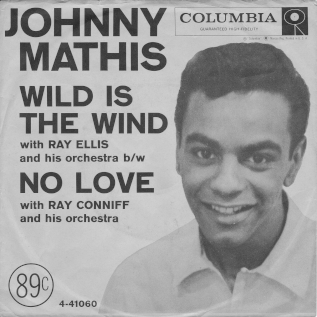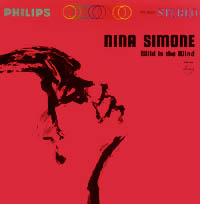
The Animals are an English rock band, formed in Newcastle upon Tyne in the early 1960s. The Animals are known for their deep-voiced frontman Eric Burdon and for their gritty, bluesy sound, exemplified by their signature song and transatlantic number-one hit single "The House of the Rising Sun" as well as by hits such as "We Gotta Get Out of This Place", "It's My Life", "Don't Bring Me Down", "I'm Crying", "See See Rider" and "Don't Let Me Be Misunderstood". They balanced tough, rock-edged pop singles against rhythm-and-blues-oriented album material and were part of the British Invasion of the US.

Nina Simone was an American singer, songwriter, pianist, composer, arranger and civil rights activist. Her music spanned styles including classical, folk, gospel, blues, jazz, R&B, and pop. In 2023 Rolling Stone ranked Simone at No. 21 on their list of the 200 Greatest Singers of All Time.
Mississippi is a state of the United States of America.

"Wild Is the Wind" is a song written by Dimitri Tiomkin and Ned Washington for the 1957 film Wild Is the Wind. Johnny Mathis recorded the song for the film and released it as a single in November 1957. Mathis' version reached No. 22 on the Billboard chart. It was nominated for an Academy Award for Best Song in 1958, but lost to "All the Way" by Jimmy Van Heusen and Sammy Cahn from The Joker is Wild.

Wild Is the Wind is the sixth studio album by American singer and pianist Nina Simone released by Philips Records in 1966. The album was compiled from several recordings that were left over from sessions for previous Philips albums.

Mavis Staples is an American rhythm and blues and gospel singer and civil rights activist. She rose to fame as a member of her family's band The Staple Singers, of which she is the last surviving member. During her time in the group, she recorded the hit singles "I'll Take You There" and "Let's Do It Again". In 1969, Staples released her self-titled debut solo album.
"Feeling Good" is a song written by English composers Anthony Newley and Leslie Bricusse for the musical The Roar of the Greasepaint – The Smell of the Crowd. It was first performed on stage in 1964 by Cy Grant on the UK tour.

"Don't Let Me Be Misunderstood" is a song written by Bennie Benjamin, Horace Ott and Sol Marcus for American singer-songwriter and pianist Nina Simone, who recorded the first version in 1964. "Don't Let Me Be Misunderstood" has been covered by many artists. Two of the covers were transatlantic hits, the first in 1965 by the Animals, which was a blues rock version; and in 1977 by the disco group Santa Esmeralda, which was a four-on-the-floor rearrangement. A 1986 cover by new wave musician Elvis Costello found success in Britain and Ireland.

Live at Ronnie Scott's is an album by American singer-songwriter Nina Simone. It is a live recording of a concert she gave at Ronnie Scott's Jazz Club in 1984, a London venue where she performed a few times in her later life.

Nina Simone in Concert is an album by the jazz singer Nina Simone. It is her first album for the record label Philips, composed of three live recordings made at Carnegie Hall, New York City, in March and April 1964. Simone recorded Nina Simone at Carnegie Hall in 1963 for Colpix.
Freedom songs were songs which were sung by participants in the civil rights movement. They are also called "civil rights anthems" or, in the case of songs which are more hymn-like, they are called "civil rights hymns."
"Ain't Got No, I Got Life" is a 1968 single by American singer-songwriter Nina Simone, from her album 'Nuff Said. It is a medley of two songs, "Ain't Got No" and "I Got Life", from the musical Hair, with lyrics by James Rado and Gerome Ragni and music by Galt MacDermot. The combination of the two songs was rewritten by Simone to suit her purpose.
"To Be Young, Gifted and Black" is a song by Nina Simone with lyrics by Weldon Irvine. Simone introduced the song on August 17, 1969, to a crowd of 50,000 at the Harlem Cultural Festival, captured on broadcast video tape and released in 2021 as the documentary film Summer of Soul. Two months later, she recorded the song as part of her concert at Philharmonic Hall, a performance that resulted in her live album Black Gold (1970). Released as a single, it peaked at number 8 on the R&B chart and number 76 on the Hot 100 in January 1970. A cover version by Jamaican duo Bob and Marcia reached number 5 in the UK Singles Chart in 1970.

Ledisi Anibade Young, better known simply as Ledisi, is an American R&B and jazz recording artist, songwriter, music producer, author and actress. Her name means "to bring forth" or "to come here" in Yoruba.
"Sea Lion Woman" is a traditional African American folk song originally used as a children's playground song.
Women in jazz have contributed throughout the many eras of jazz history, both as performers and as composers, songwriters and bandleaders. While women such as Billie Holiday and Ella Fitzgerald were famous for their jazz singing, women have achieved much less recognition for their contributions as composers, bandleaders and instrumental performers. Other notable jazz women include piano player Lil Hardin Armstrong and jazz songwriters Irene Higginbotham and Dorothy Fields.
"Go Limp" is the penultimate track on Nina Simone's 1964 album Nina Simone in Concert, and is an adaptation of a protest song originally written by Alex Comfort during his involvement with the Campaign for Nuclear Disarmament.
The history of the 1954 to 1968 American civil rights movement has been depicted and documented in film, song, theater, television, and the visual arts. These presentations add to and maintain cultural awareness and understanding of the goals, tactics, and accomplishments of the people who organized and participated in this nonviolent movement.

The Amazing Nina Simone is a 2015 American documentary film by director Jeff L. Lieberman. The film details the life, legacy and musical accomplishments of singer, musician, pianist, songwriter and Civil Rights activist, Nina Simone through interviews with over 50 of her friends, family, band members, lovers and fellow activists. The film has been called the best of the three Nina Simone films by The New Yorker Magazine, and "The Nina Simone film we should all be watching" by Blavity.
"Black Rage (sketch)" is a protest song by American recording artist Lauryn Hill. The song was originally performed by Hill as a poem, in support of her "Life is Good/Black Rage" tour with American rapper Nas, in 2012. It was re-released on SoundCloud, as a song on August 20, 2014. The song takes it melody from the Rodgers and Hammerstein classic "My Favorite Things", however the song's lyrics feature a much darker undertone and reflects on the history of racism in the United States.










